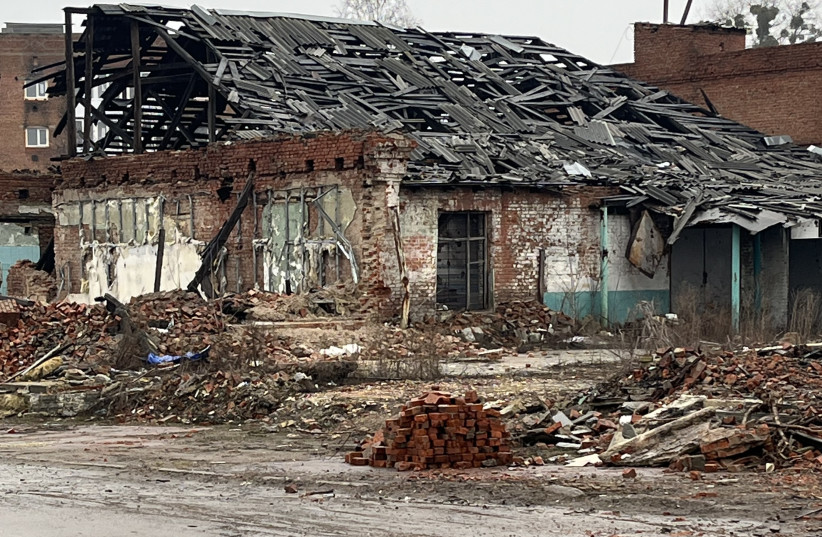POLTAVA, Ukraine – Two years after the initial Russian incursion into Ukraine, the wounds of war are slow to heal in areas suffering from rocket attacks or previously occupied by Moscow.
Along the road from Poltava into the Sumy oblast, still-abandoned homes lay with collapsed wooden roofs, destroyed by artillery or mortars. An eerie white mist flowed around the houses, hovering above patches of snow.
Cement islands peaked from an icy river; nearby, the column of what had once been a bridge stood defiant against a lazy rain. The bridge was destroyed during the war, but a pale replacement has been built alongside it.
In Trostyanets, which was seized by the Kremlin for over a month before being liberated in March 2022, some homes and businesses still lay in ruins. Red bricks lay scattered in piles along the ground. In the train station area, the damage seemed heaviest, with the husks of buildings marked by bullets of various calibers, the signs of battle. Tin canopies above windows have been warped by tongues of flame.
Demolitions of unsalvageable buildings and the construction of new ones have begun, but it seems that in general, the area has been slow to advance from the past. Many of the buildings are plain Soviet blocs, and one old 1970 administrative building was still adorned with an iron communist star. The balconies of an apartment building damaged in the fighting have been replaced, but black soot still colored the brick. Bullet holes were plastered on another building.
Memorials with pictures of fallen soldiers were erected along a main road in the town. Recruitment billboards for the Ukrainian forces stood in towns and cities, but it wasn’t clear who was left there to heed the call; not many young men could be seen in Odesa, Poltava, or Sumy. Instead, they were found at the many checkpoints encountered on the road to Sumy. One of the soldiers, however, couldn’t have been younger than 70.

One of the soldiers who recently fell was the 22-year-old nephew of the caregiver of Aleksandra Krivko, an elderly Jewish woman who lived alone in the rural village of Chilovka. His funeral was held a few weeks ago, she said.
“It is sad to see young people’s lives cut short,” said the 80-year-old.
The war has cut her off from her two daughters in Crimea, whom she could talk to only occasionally by phone. Her other daughter lived in Israel.
Krivko lived alone and hadn’t gone outside since her husband died 10 years ago. While she couldn’t move without aid, she didn’t want to burden her daughters. This was her final destination, she said – the little room where she was surrounded by crossword puzzles and art supplies. She couldn’t draw, but coloring books provided her with a means to combat stress and distract her from illness and the war.
“Of course I am stressed because of everything that’s happening,” said Krivko. “I don’t understand why people can’t just get along.”
Rocketing prices
One of the war stressors was the rocketing prices of everything from food to medicine. With a 3000-hryvnia (roughly $78) monthly pension, “I don’t know how I would survive” without the support of civil society organizations like Hesed, she said.
Hesed, the former Soviet Union community network formed by the American Jewish Joint Distribution Committee (JDC), bought her food and paid for winter heating, cleaning supplies, medicine, and a 25-hour-a-week caretaker. She said that volunteers even came in the winter, as well as when missiles flew above her house.
“I don’t need much. I’m old, and I want to be healthy, and I want peace,” for both Ukraine and Israel, Krivko said.
Krivko was thankful to those who donated to Ukrainian Jews impacted by the war through organizations like the International Fellowship of Christians and Jews (IFCJ).
“I would like to tell the Jewish community to stay strong,” she said.
A HEAT WAVE had melted away much of the winter snow in the village, leaving thick, black mud. It would have been difficult for emergency services to reach Krivko; the vehicle of IFCJ representatives who brought aid packages got stuck in the mud road and had to be pulled out by a tractor.
Regular roads were not in much better shape; many of those between cities and towns were degraded during the war and left full of potholes in the winter. Like Krivko, they have fallen into cracks, like those running through the roads themselves.
While Odesa remained lovely, its beautiful shops and opera house are a sharp contrast to some of the streets that have been neglected. Many of the colorful buildings have been boarded up, and windows were shattered by drone or rocket attacks. The famous Potemkin Stairs were closed off with barbed wire. From the steps, the ruins of a port hotel can be seen in full. The tower has been blackened, and cement and rooms lay bare to the wind.
Sunday was the first time in a while that a night wasn’t interrupted by air-raid sirens, locals said. Sirens rang out across Ukraine on Tuesday night. Russian drones hit a power plant in Dnipro, the DTEK Group said on Telegram on Wednesday, adding, however, that a blackout had been averted. Diesel generators have become a common sight in public and private areas; the JDC (American Jewish Joint Distribution Committee) building in Poltova maintains one, allowing Jewish residents a place of warmth and safety during blackouts and brownouts.
Sirens rang again in Poltova on Wednesday. The wounds of war are difficult to heal when new cuts strike the nation deep, with the pain echoing throughout the cities like the warning klaxons.
